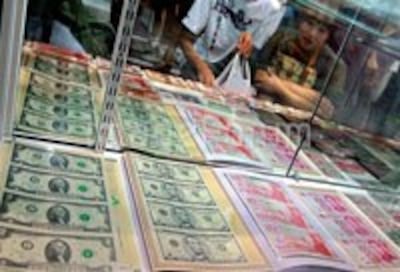
China would be unable to retaliate against U.S. trade measures by selling dollars or U.S. Treasury bills from its growing reserves, despite media speculation that it could, experts say.
World markets were briefly rattled in early August after comments by two Chinese academics were published in the London-based Daily Telegraph, suggesting that Beijing might use its U.S. $1.3 trillion of foreign currency reserves to pressure the United States over U.S. criticism of China's tight controls over the yuan.
“The Chinese government has begun a concerted campaign of economic threats against the United States, hinting that it may liquidate its vast holdings of U.S. Treasury bonds if Washington imposes trade sanctions to force a yuan revaluation,” the paper said.
U.S. officials have been negotiating with China for several years over the currency issue, seeking to address complaints from manufacturers that China deliberately undervalues the yuan to gain an advantage in trade.
Last year, the U.S. trade deficit with China reached a record U.S. $233 billion, but officials have had little success in persuading China to let the yuan’s value rise.
Move would ‘backfire’
The standoff has spurred the U.S. Congress to pursue legislation that could raise tariffs against Chinese goods and bring the currency complaints before the International Monetary Fund (IMF) and the World Trade Organization (WTO).
“If you sell dollars, you’re probably going to be buying euros or yen or some other currency. It’s going to make those currencies more expensive. There are going to be further outcries from the European Union. It also is going to be a signal to speculators that [China is] having a hard time controlling the yuan.”
In an interview with Radio Free Asia, Harvard University economist Dale Jorgenson said that if China were to sell a major portion of its dollar holdings, this would “achieve precisely the goals that have been identified in the U.S. Congress, namely reducing the value of the dollar to make U.S. exports more attractive.”
“So, I don’t think it would really achieve any goal that the Chinese would have in mind.”
Jorgenson said the yuan’s value relative to the dollar would be affected only if China sold dollars and bought yuan instead of other Western currencies, such as the euro. Buying yuan would backfire on Beijing in other ways too, though, Jorgenson said.
“That would expand the Chinese domestic money supply [and] would add to the domestic inflationary pressures that the Chinese are already trying to guard against,” he said.
Patricia Mears, director of international commercial affairs at the Washington-based National Association of Manufacturers, called the threatened Chinese attempt at monetary retaliation “not really tenable.”
“It would end up harming them as well,” Mears said. “If you sell dollars, you’re probably going to be buying euros or yen or some other currency. It’s going to make those currencies more expensive. There are going to be further outcries from the European Union. It also is going to be a signal to speculators that [China is] having a hard time controlling the yuan.”
Mears dismissed China’s implied threat as “sabre-rattling.”
“Of course, they’re concerned about legislation that’s in Congress, and I’m sure this is an effort to say, ‘We would push back if you did anything.’ But in fact, if you look at it, it would not be for China a good way to push back.”
Original reporting by Michael Lelyveld. Edited for the Web by Richard Finney.
